How Australians have ruined Kuta
FROM school kids to middle-aged revellers, for years Kuta has pulled in free-spirited Aussies ready to party. But did we start a downward spiral into chaos?
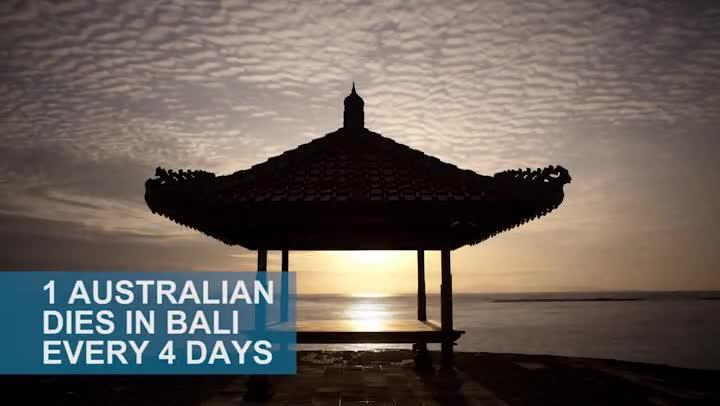
YOU see it the moment you enter the main drag. From the supersized image of AFL on the big screen to the drunk middle-aged Australian woman walking the street with a giant, stoned python around her neck, there is no denying Kuta is a place for Australians.
For many of us the strip will be our first taste of overseas travel. Often we arrive fresh out of school, aged 17 and 18, for schoolies. Emboldened by fat wallets, cheap liquor and a deceptive lack of official laws, there is a tendency to have a bit too much fun with often deadly consequences.
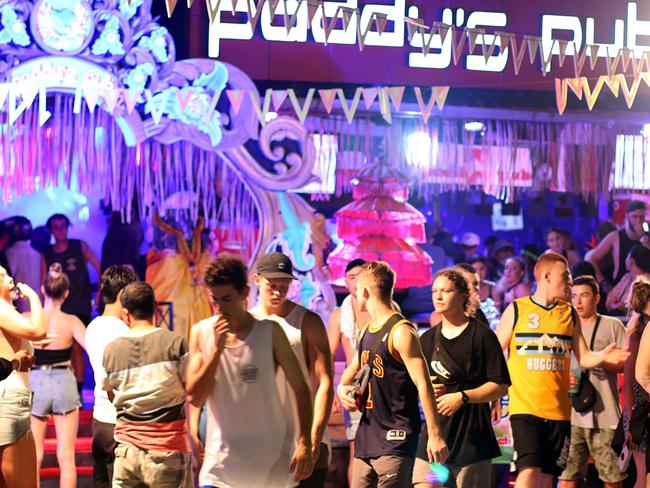
From May 2015 to May 2016, 59 Australians died in Bali — more than one a week — with a total of 93 across Indonesia.
Prior to arriving here, a young Australian told me of his first night in Kuta in which he watched a tourist fall off a third story nightclub balcony and break his neck, dying instantly. Before the grief could set in, police scooped up the corpse and slid it into the back seat of a Blue Bird taxi.
“The weirdest thing about it — and I feel bad now — but everyone pretty much went straight back to partying,” he told me.
It’s dusk when I arrive and the Balinese are lined along the footpaths, enjoying the local cuisine Nasi Jingo (shredded, spiced chicken, rice, tempeh and beans served in banana leaf) on the back of mopeds and along the gutter.
It’s relatively quiet compared to what’s coming, providing an important clue as to how this place operates. The average tourist might miss it, especially after 10 Bintangs, but the sense of community is strong here, evident in the smiles, laughter and camaraderie of the many vendors, hustlers, and transport men as they eat.
Some have roots running centuries deep in this area. Others have come from across Indonesia to sell their wares and often their bodies. Poverty is the common denominator and it is a strong bond, setting them up as the natural antagonists to the rich, drunk, often disrespectful tourists who will soon descend on the strip.
I first came here as a 17-year-old on a schoolies trip in 2004, two years after the first Bali bombing at the Sari Club that killed 202 (including 88 Australians) and a year before the second at Jimbaran Bay, killing 23, including four Australians.


Kuta was beyond anything I could have imagined; lawless, dripping in sweat, sex and cheap liquor and hellish on a hangover. I assumed, at that point Kuta was typical of Bali, and Bali of the rest of Asia’s big-time party islands. Thirteen years later, having travelled Asia and the world, I can say neither is true.
At the first bar I take a seat with a group of young Australian women. One pulls out her phone and shows me footage of her friend having a beer bottle smashed over her head a night earlier by a local sex-worker at a nightclub
“We were just being dickheads. My friend bumped into this hooker — it was nothing really — but she fully cracked it,” the 19-year-old laughs.
The girls attract the attention of several young Balinese men, one of whom, I am informed, is the son of an infamous local gangster. He has the word ‘Respect’ tattooed on his forehead and is covered in gold. He can get us everything from shabu (ice) to cocaine, ecstasy, marijuana and mushrooms with impunity.
“That’s why all the chicks love ‘im ‘ere,” the young Australian tells me.
Few western tourists properly understand the power dynamics of this island. Notably, that it is run by gangsters as much as police (law enforcement gave up the moral high ground decades ago when they indulged in constant, barely concealed bribery and corruption). As a foreigner in Bali today it’s hard to know who to turn to when things go wrong.
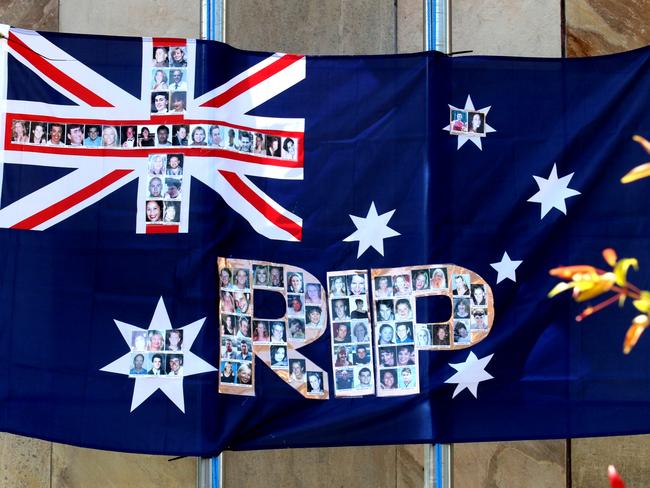
The difference between the young gangsters in this bar and the street hawkers hassling you to buy Viagra or pseudoephedrine outside is not immediately obvious. But you’ll find out quick enough if you disrespect the wrong person. The consequences can be life-changing.
In Paddy’s nightclub later, I stand in the midst of a spellbinding laser show and watch a performance by the diminutive Michael Jackson-impersonator I’d lined up with moments ago on the street to buy a serving of Nasi Jingo for the equivalent cost of 50c. A sex-worker caked in make-up seized my arm and dragged me on to the dance floor, spinning herself around and brushing my hands across her breasts.
“Where you frommmmm?” she asks into my ear, running her hands down my sides.
“Erm, Australia,” I reply, as I beat a quick exit, checking that my wallet and phone are still in my pockets (they are). Pick-pockets are a constant threat in Kuta. If caught, however, they run the risk of being lynched to death by other angry locals.

The crowd is a combination of barely conscious bald and balding middle-aged white men surrounded by sex-workers; western 20-somethings on stage belting out the same lyrics to the same party anthems that were on rotation here when I was 17; and a middle-aged white woman next to me being aggressively woo’d by a young Balinese man.
When I take a seat next to one of the young Australian women from the bar, a young Balinese man sits on her lap, then stands up and gestures at me with his fingers to make sure I know he’s making eyes at her. He’s trying to get a reaction, probably to bait me into a fight. I ignore it but I could see a drunker person in my position falling for it.
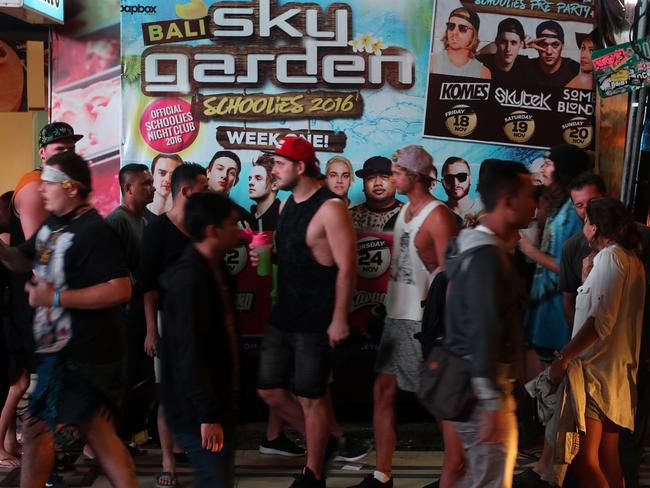
Kuta has been locked in a downward tit-for-tat karmic spiral for years now. Balinese react to the drunken, clumsy, disrespectful antics of westerners with passive aggression, usually in the form of aggressive hawking and hassling. And westerners with frustration, racism and increasing disrespect. Who cast the first stone has long been forgotten and this ‘chicken or the egg’ scenario can have consequences ranging from irritability to fatalities.
“We believe in that here. Sometimes people can be karma. If you do something stupid, maybe someone will do something stupid to you,” a local tattoo artist on the infamous Jalan Poppies II explained to me.
“I think tourists behave OK here. Just some of the teenagers who come here for schoolies are a bit stupid. But we (at the tattoo parlour) not have much problem. It’s in the nightclub you take a big risk. No one respect each other in there,” he said.
It wasn’t always this way. The Australian surfers who first arrived here in the 1970s, now aged in their sixties and seventies, were welcomed with warmth and curiosity. Their photos of Kuta lined with palm trees and smiling villagers can be seen with a quick google images search (“Kuta + 1970s”). Where it went downhill is hard to pinpoint but it likely had something to do with globalisation, the diminishing cost of air travel and the accessibility and cheapness of Asia to an overworked, under-educated kind of Australian whose main concern is living it up for less rather than cultural enrichment.
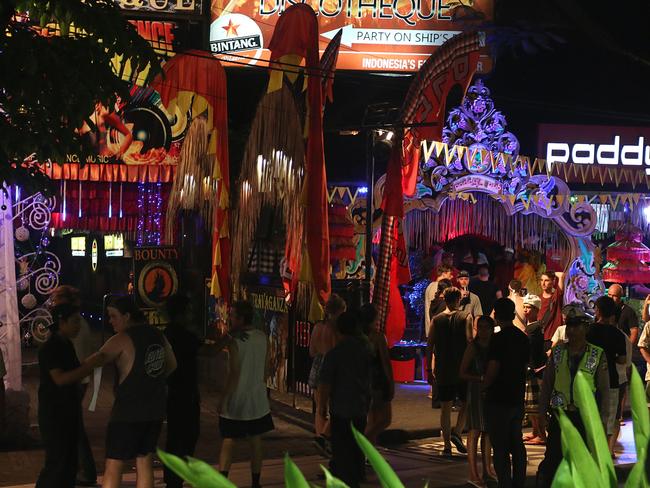
If you want to go further into this karmic struggle, you could also examine the reasons behind the yawning gap in living standards between Indonesians and Australians; namely our role in the coup that toppled the philanthropic President Sukarno to be replaced by the brutal and infamously corrupt military dictator, General President Suharto.
Show a basic handle of their language and an interest in local food, culture and customs and you will always get a measure of respect here. When I make chitchat with a bartender, and compliment him on the quality of the street food outside, he touches his heart as he thanks me. It’s an emotional gesture I can only assume stems from years of loud, ignorant westerners not bothering to show the slightest interest in his culture. Karma has a way of sorting these people out and the Balinese know this.
It might be a hamburger topped with poorly refrigerated meat and cheese as easily as a drunken moped crash or a broken bottle to the head. One way or another, you are prisoner of your own behaviour on an island that, for the most part, takes no prisoners.



